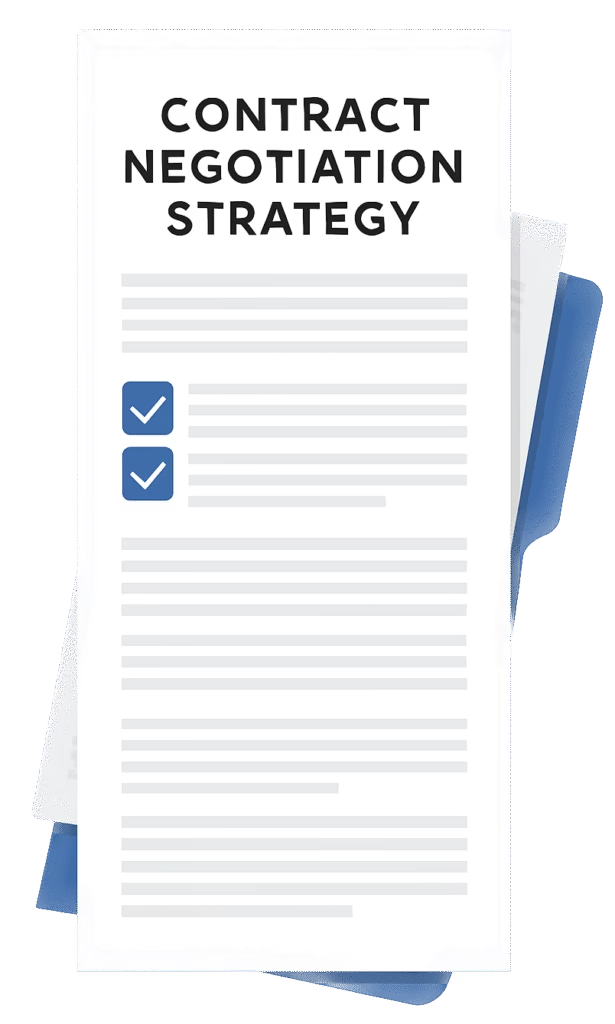Preparing for Successful Negotiations: A Startup’s Guide to Getting Ready

For startups, every contract negotiation is a high-stakes opportunity to secure favorable terms, protect resources, and build partnerships that drive growth. Yet, diving into negotiations without proper preparation is like launching a product without a business plan—risky and likely to backfire. Preparation is the cornerstone of successful contract negotiation, especially for startups with limited resources and negotiating power. By investing time upfront to research, strategize, and assemble the right team, you can level the playing field and negotiate with confidence.
In this second installment of our Contract Negotiation Strategies for Startups series, we explore the critical steps to prepare for successful negotiations. From researching the other party to setting clear objectives and building a negotiation team, this guide will help you approach every contract discussion with clarity and purpose.
Why Preparation Matters for Startups
Startups often negotiate from a position of relative disadvantage—whether it’s limited cash flow, a small team, or a lack of brand recognition. Preparation bridges this gap by giving you a clear understanding of your goals, the other party’s motivations, and the leverage you can bring to the table. Effective preparation:
- Maximizes Leverage: Understanding the other party’s needs and constraints allows you to craft offers that align with their interests while securing your priorities.
- Reduces Risks: Thorough preparation helps you spot potential red flags in contracts, such as ambiguous terms or unfavorable clauses, before they become problems.
- Builds Confidence: Knowing your objectives and having a game plan empowers you to negotiate assertively, even against larger or more experienced counterparties.
- Saves Time: A well-prepared negotiation is more efficient, avoiding unnecessary back-and-forth and costly delays.
Whether you’re negotiating a vendor agreement, a client contract, or an investor term sheet, preparation is the foundation for achieving outcomes that support your startup’s growth.
Step 1: Researching the Other Party
Knowledge is power in negotiations, and researching the other party is the first step to gaining that power. Understanding their goals, constraints, and reputation equips you to tailor your approach and anticipate their moves. Here’s how to conduct effective research:
- Understand Their Business: Learn about the other party’s industry, business model, and financial health. For example, if negotiating with a supplier, check their pricing models or customer reviews on platforms like X or industry-specific forums. A SaaS startup negotiating with a cloud provider might discover that the provider is pushing for long-term contracts to boost their own revenue stability, giving you leverage to negotiate flexible terms.
- Identify Their Goals: What does the other party want from the deal? A client might prioritize fast delivery, while an investor might focus on equity stakes or board control. Use public information, such as company websites, press releases, or LinkedIn profiles, to uncover their priorities.
- Assess Their Reputation: Look for insights into their negotiation style and reliability. Have they been flexible with other startups? Are there complaints about late payments or poor communication? For instance, a quick search on X for posts about a vendor might reveal whether they’re known for rigid terms or exceptional service.
- Evaluate Market Context: Understand the broader market dynamics. Are there competing suppliers offering better terms? Is the client under pressure to meet a deadline? This context can strengthen your position. For example, if you’re a tech startup negotiating with a software vendor in a competitive market, you might leverage their competitors’ pricing to secure a discount.
Actionable Tip: Create a one-page research summary before negotiations, outlining the other party’s goals, pain points, and potential leverage points. This keeps your team aligned and focused during discussions.
Generate A Free Contract Negotiation Strategy Document
Create a comprehensive contract negotiation strategy document using proven frameworks like BATNA, ZOPA, and other negotiation models.

Step 2: Setting Clear Objectives and Priorities
Negotiations can quickly become chaotic without a clear sense of what you want to achieve. Startups, with their limited resources, must prioritize their goals to avoid overcommitting or settling for suboptimal terms. Here’s how to set effective objectives:
- Define Your Must-Haves vs. Nice-to-Haves: Identify non-negotiables (e.g., protecting intellectual property in a partnership agreement) and areas where you can compromise (e.g., delivery timelines). For example, a bootstrapped startup negotiating with a manufacturer might prioritize extended payment terms (net 60 instead of net 30) over a slight discount.
- Set Measurable Goals: Make your objectives specific and quantifiable. Instead of “lower costs,” aim for “a 10% discount on annual licensing fees” or “a 12-month contract with a renewal clause.” This clarity helps you evaluate offers and stay focused.
- Know Your BATNA: Your Best Alternative to a Negotiated Agreement (BATNA) is your fallback plan if the negotiation fails. For instance, if you’re negotiating with a marketing agency, your BATNA might be working with a freelancer or handling marketing in-house. A strong BATNA gives you confidence to walk away from a bad deal.
- Align with Your Startup’s Vision: Ensure your objectives support your long-term goals. For example, a startup aiming to scale rapidly might prioritize flexible vendor contracts that allow for increased orders, while a cash-strapped startup might focus on deferred payments.
Actionable Tip: Use a prioritization matrix to rank your objectives by importance and feasibility. Share this with your team to ensure everyone is aligned before entering negotiations.
Step 3: Building a Negotiation Team
Startups often have small teams, but even a solo founder can benefit from assembling a “negotiation team” by involving advisors, co-founders, or external experts. A well-structured team ensures you cover all angles—legal, financial, and strategic. Here’s how to build and manage your team:
- Assign Clear Roles: Designate who will lead the negotiation, who will handle technical details (e.g., reviewing contract clauses), and who will take notes or track action items. For example, a founder might lead discussions, while a co-founder with legal expertise reviews terms.
- Involve Experts When Needed: For complex contracts, such as investor term sheets or IP-heavy partnerships, consider hiring a lawyer or consultant. Even a one-hour consultation can prevent costly mistakes. For instance, a startup negotiating a venture capital deal might bring in a lawyer to scrutinize equity and control provisions.
- Leverage Internal Expertise: If your team includes someone with industry experience (e.g., a CTO with prior vendor negotiations), tap into their knowledge. Their insights can help you anticipate counterparty objections or identify hidden opportunities.
- Practice as a Team: Before the negotiation, rehearse key points and potential scenarios. Role-play tough questions or pushback from the other party to refine your approach. For example, if negotiating with a client, practice responding to demands for lower pricing or faster delivery.
Actionable Tip: Create a negotiation playbook outlining each team member’s role, key talking points, and fallback positions. This ensures everyone is prepared and aligned, even in high-pressure situations.
Practical Steps to Tie It All Together
To turn preparation into action, follow these steps before every negotiation:
- Create a Timeline: Set deadlines for research, internal discussions, and the negotiation itself to stay organized and avoid last-minute scrambles.
- Draft a Term Sheet or Proposal: Outline your ideal terms in advance to serve as a starting point. For example, a startup negotiating with a supplier might propose a draft agreement with flexible payment terms and scalability clauses.
- Anticipate Counteroffers: Prepare responses to likely objections or counteroffers. If a client pushes for a lower price, you might counter with a longer contract term to secure revenue stability.
- Use Technology: Leverage tools like contract management software (e.g., DocuSign, PandaDoc) to organize documents and track changes. For complex negotiations, AI tools can help analyze contract drafts for risky clauses.
- Stay Flexible: While preparation is key, be ready to adapt if new information emerges during negotiations. For example, if a vendor reveals budget constraints, you might pivot to a revenue-sharing model.
Conclusion
Preparation is the secret weapon that empowers startups to negotiate like seasoned pros, even against larger or more experienced counterparties. By thoroughly researching the other party, setting clear objectives, and building a cohesive negotiation team, you can approach contract discussions with confidence and clarity. These steps not only increase your chances of securing favorable terms but also lay the groundwork for strong, lasting partnerships.
In the next article of our series, we’ll dive into Key Contract Clauses Startups Should Focus On, exploring the specific terms that can protect your interests and drive value. Until then, start preparing for your next negotiation by researching your counterparty and defining your must-haves. With the right groundwork, your startup can turn every contract into a stepping stone for success.
- RamenLegal
- RamenLegal



